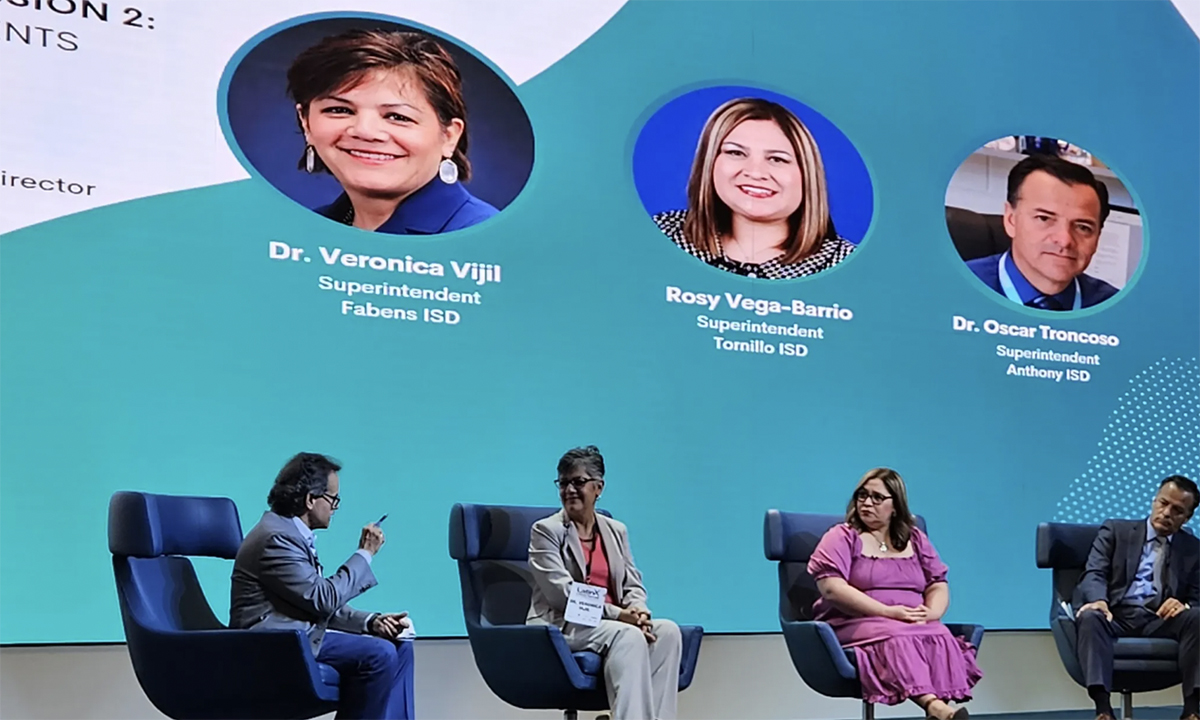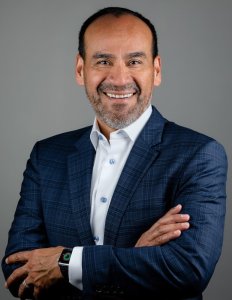Educators, Technology Entrepreneurs Search For Solutions at Summit
Summit participants talked about technology and its application.

Get stories like this delivered straight to your inbox. Sign up for The 74 Newsletter
Among the goals of the recent LatinX Edtech Summit: Bridging the Digital Divide was to connect local educators and emerging technology entrepreneurs who could collaborate on an idea that could generate a long-term impact that would benefit underrepresented students and communities.
About 140 K-12 and higher education teachers, administrators, business leaders, technology investors and representatives from national organizations with vested interests in all levels of education gathered for the second annual summit on June 16, 2023, in the Region 19 Starlight Event Center, 6650 Continental Drive, near the El Paso International Airport.
Whether in the main hall or in the exhibit area, summit participants talked about technology and its application. Buzzing among the participants was Joseph Sapien, CEO and executive director of the STTE (Success Through Technology Education) Foundation, the event’s lead organizer.
Sapien helped found STTE, an El Paso-based nonprofit that works to develop, deploy and advance educational programs to enhance the chances that tomorrow’s students are digitally literate and ready to join the 21st-century workforce.
“A year, two years, five years from now, because of those connections, education and technology are going to be exponentially advanced,” he said while exhibitors pitched their tech products in the background. “The technologies that are here are very fascinating. I’m looking forward to seeing what happens because of this event.”
Pew Research Center reports from 2021 and 2022 showed that while many Hispanics use smartphones, not as many own computers or have internet access to save money. This digital exclusion means that more than half of the Latino workforce is not ready to be part of the digital economy. The summit is among the ongoing efforts to enhance digital equity in Latino households, especially those in rural communities. These plans include access to affordable broadband, which experts believe will lead to the improved digital skills needed for today’s tech jobs.
Eddie Rodriguez, executive director of CREEED (Council on Regional Economic Expansion and Education Development), one of the summit’s sponsors, said the main thing his organization wanted to stress was a continuous commitment to higher education to achieve economic success.
Rodriguez said that a high-quality public education should provide students, regardless of their socio-economic background, with a launching point for a productive life.
“It’s going to take every shoulder to the wheel to effectively get us to that destination that will increase the trajectory of our economic opportunity,” Rodriguez said.
The CREEED official moderated one of the summit’s panel discussions about the importance of technology in rural areas. The panelists were Veronica Vijil, Rosy Vega-Barrio and Oscar Troncoso, who are superintendents of the Fabens, Tornillo and Anthony independent school districts, respectively. These small districts serve rural communities on the western and eastern edges of El Paso.
The trio noted how the pandemic sped up the use of technology at the K-12 level, and quickly raised the competency of teachers for virtual instruction, but it also revealed the need to expand internet access to allow greater communication between schools and students and their households.
Troncoso said that a side benefit was that parents, who often were Spanish speakers, could use their child’s laptop to access language applications to learn English. He also said that students who mastered the technology became eligible for more college scholarship opportunities to include some for competitive Esports at New Mexico State University.
The trio touted how artificial intelligence (AI) programs could be powerful tools to help their students to improve their English proficiency, especially in written communication, and to give a voice to students with disabilities by enhancing their social skills.

Jacob Fraire, president of the ECMC Foundation, another summit sponsor, said he expected to hear new ideas from Latino leaders in education, technology and entrepreneurship about how tech-enabled learning could benefit Latino students, which is a growing community across the state and the country and one that traditionally underperforms at the post-secondary level compared to white students.
According to recent U.S. Census Bureau data, the population of Texas passed 30 million in 2022. Of that, 49.3% of the population age 17 and younger are Hispanic. The same data showed that only 70% of Hispanic adults earned a high school diploma and only 18% received a college degree.
Fraire said ECMC, a Los Angeles-based organization, works to improve higher education and career opportunities for underserved populations throughout the country that do not traditionally graduate from colleges and universities.
“We’re hoping to bring to light those ideas of how we can do better,” Fraire said. “In order for us to serve the Latino community more effectively, we have to be intentional about our saying that in this community, we intend to serve explicitly. That’s why we’re here today.”
One of the event’s keynote speakers, Sarita E. Brown, co-founder and president of Excelencia in Education, said she was at the summit because Excelencia wants to work with institutions that reach Latino students, serve them well, and propel them into the workforce and society.

Brown said her organization is well aware of El Paso’s strengths and potential, and that the summit highlights the region’s ability to combine human capital with practical and tactical solutions. She lauded its residents, who for decades were underrepresented and underestimated, because they made the most of their bilingualism and biculturalism, especially as first-generation college students. Now the state, the nation and the world see the “vibrance” in the area because of UTEP being a top-level academic research university and the expansion of El Paso Community College. The student populations at both of those institutions are heavily Latino.
She said the summit was an opportunity for academic leaders to listen to entrepreneurs and technology developers about cutting-edge ideas that could benefit their students. She said that her question for every educator and tech person in the room was how they plan to efficiently connect with each other to benefit Latinos, who will make up a larger percentage of higher education students in the future.
“They’re definitely looking at challenges, but are rising to meet them,” she said.
This article first appeared on El Paso Matters and is republished here under a Creative Commons license.
Get stories like these delivered straight to your inbox. Sign up for The 74 Newsletter

;)